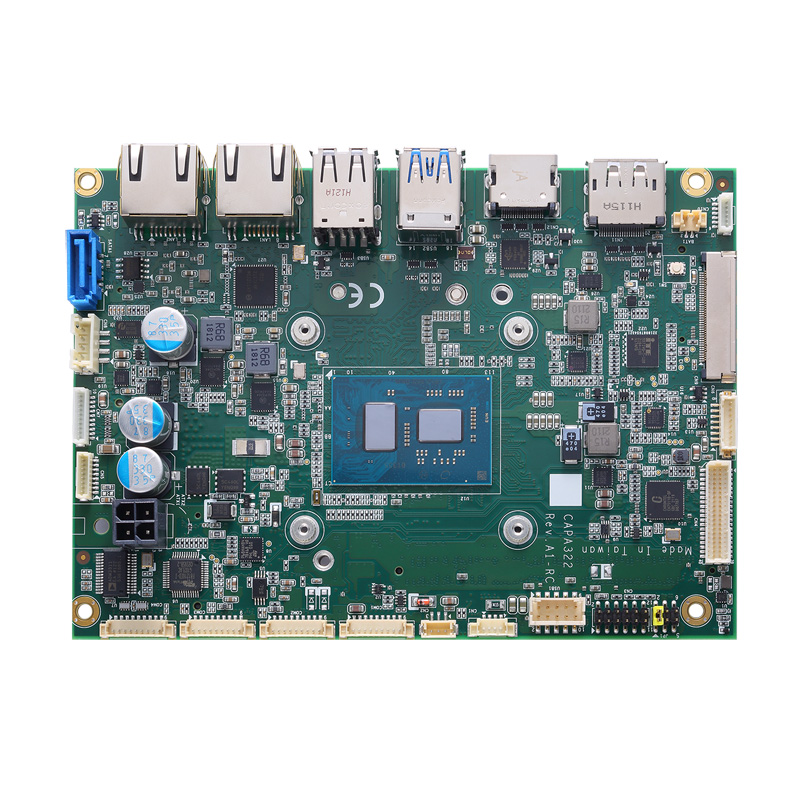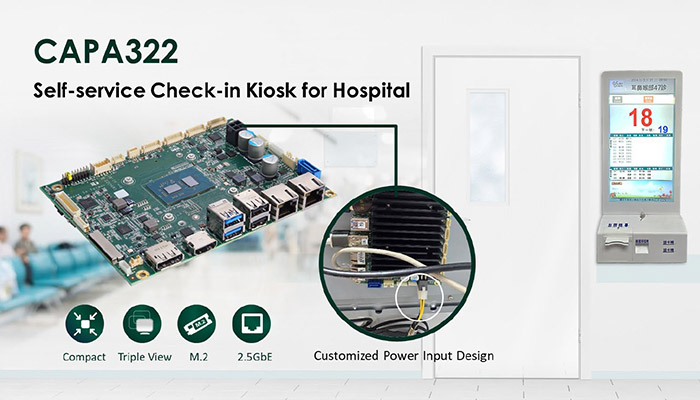| |
In recent years, healthcare facilities have increasingly embraced technology to enhance patient experiences and streamline operations. Among the most impactful innovations are self-service check-in kiosks, which provide a user-friendly alternative to traditional check-in processes, allowing patients to take control of their arrival experience while significantly reducing wait times and administrative burdens.
|
|
|
| |
|
The customer was looking for a 3.5-inch embedded SBC to develop a self-service check-in and queuing kiosk for a university hospital in Taiwan. The industrial-grade motherboard needed to feature a fanless design and a quad-core processor to ensure reliability during continuous use in a medical environment. Additionally, the total system thickness had to be less than 3 cm, presenting a unique design constraint that required a customized hardware solution.
|
| |
| Main Requirements |
- 3.5” embedded SBC with fanless design
- Quad-core processor with a base frequency of 2.0 GHz or higher
- Supports HDMI and DP outputs
- 1 COM port and 7 USB ports
- Compact design for restricted space
- Wi-Fi connectivity for real-time updates of patient information and queuing tasks
|
| |
|
The Impact of Self-Service Check-in Kiosks in Hospitals
|
|
| |
|
 Axiomtek has proposed its CAPA322, an Intel Atom®-based 3.5-inch embedded board featuring dual 2.5GbE LAN ports and two M.2 slots (Key E and Key B) for 5G/ LTE/4G/Wi-Fi connection. The single-board computer is upgraded tremendously in connection speed and expandability to meet various demands for expansion and connectivity in IoT applications. In addition, the CAPA322 provides a triple view which includes HDMI 2.0 and DisplayPort++; while the LVDS co-layouts with the eDP, the user could choose either one according to the demand. Axiomtek has proposed its CAPA322, an Intel Atom®-based 3.5-inch embedded board featuring dual 2.5GbE LAN ports and two M.2 slots (Key E and Key B) for 5G/ LTE/4G/Wi-Fi connection. The single-board computer is upgraded tremendously in connection speed and expandability to meet various demands for expansion and connectivity in IoT applications. In addition, the CAPA322 provides a triple view which includes HDMI 2.0 and DisplayPort++; while the LVDS co-layouts with the eDP, the user could choose either one according to the demand.
The wide operating temperature range from -20°C to +70°C or -40°C to +85°C maximizes the deployment potential. The input power adapts 12V to 24V DC. In terms of storage, the CAPA322 provides one SATA-600 slot and a mSATA slot. The board supports optional TPM 2.0 to ensure the security of data and operations.
|
| |
|
Self-service Check-in Kiosk for Hospital
|
| |
|
The client has implemented Axiomtek’s CAPA322 in the check-in and queuing kiosks designed for the National Taiwan University Hospital in Taipei. This self-service kiosk enhances patient registration and improves operational efficiency by reducing wait times and streamlining check-in. Additionally, the customizable power input design reduces the overall thickness of the system, optimizing space and ensuring seamless integration.
|
 |
| |
| System Configurations of the CAPA322 |
- Intel® Celeron® processor N6210/J6412 or Intel Atom® x6413E processor
- 1 DDR4 SO-DIMM for up to 32GB
- 4 USB 2.0, 2 USB 3.2 Gen2, and 2 2.5GbE LAN
- 1 HDMI, 1 DisplayPort, and 1 LVDS
- 1 PCI Express Mini Card slot for USB 2.0 expansion card
- 1 M.2 Key E and 1 M.2 Key B
|
| |
|
|
| |
|
As healthcare continues to embrace digital transformation, self-service check-in kiosks are likely to become a standard feature in hospitals, helping to create a more streamlined and patient-centered environment. Healthcare providers can improve not only their operational workflow but also the overall patient journey, fostering satisfaction and loyalty in an increasingly competitive landscape.
“Integrating Axiomtek's CAPA322 embedded SBC into our hospital queuing system has significantly improved performance and efficiency. The flexibility and reliability of the board allowed us to meet the stringent demands of the medical environment seamlessly. Axiomtek's support in customizing the design of the power input position has been instrumental in reducing the overall system size, which was crucial for this project,” said the engineer of customer.
|
| |
|
|